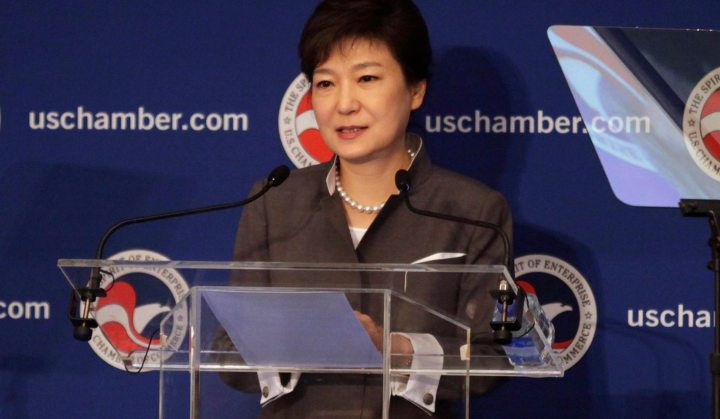Newsdeck
South Korea’s Park Urges North Korea To Choose New Path

South Korean President Park Geun-hye called on North Korea on Wednesday to end a "vicious circle" in which it raises and reduces tensions to win diplomatic rewards and buy time to build up its nuclear arms program. By Paul Eckert.
In an address to a joint session of the U.S. Congress, Park said she wanted to break the pattern in which North Korea “provokes a crisis” that draws sanctions from the international community, which later tries concessions to calm things down.
“Meanwhile, Pyongyang uses that time to advance its nuclear capabilities, and uncertainty prevails,” she said.
“It is time to put an end to this vicious circle,” Park said in English to loud applause in a packed U.S. Capitol.
South Korea’s stable financial markets and strong economic fundamentals showed Seoul was unbowed by 10 weeks of nuclear war threats from North Korea, she told U.S. lawmakers in a special session presided over by Vice President Joe Biden and House of Representatives Speaker John Boehner.
“The Korean government is reacting resolutely but calmly. We are maintaining the highest level of readiness,” said Park.
“You may rest assured: No North Korean provocation will succeed,” Park said. She echoed lines from her show of solidarity with President Barack Obama at the White House a day earlier, when Obama said Pyongyang had failed to shake their alliance of 60 years and gained nothing from saber-rattling.
The 61-year-old daughter of a former Cold War military dictator presented a vision of the future in which South Korea and its U.S. ally would deal firmly with North Korea while working for a more stable long-term peace.
“That future, I know, feels distant today,” she said.
South Korea will never tolerate a nuclear-armed North Korea and would react “decisively” to provocations from the isolated, impoverished state that has conducted three nuclear tests since 2006, Park said.
“At the same time, I will not link humanitarian aid provided to the North Korean people, such as infants and young children, to the political situation,” she said, in a reference to persistent malnutrition in the country of 25 million people.
“IT TAKES TWO HANDS TO CLAP”
She held out the possibility of aid and economic cooperation to build up trust with Pyongyang, the core North Korea policy of her successful campaign last year to become the first female leader of South Korea.
“But as we say in Korea, ‘It takes two hands to clap,'” said Park.
To gain the economic benefits of re-engagement with South Korea, North Korea “must walk the path to become a responsible member of the community of nations,” she said.
After it conducted a nuclear test in mid-February that drew swift U.N. Security Council sanctions, North Korea ramped up tensions in its neighborhood with near-daily threats to attack South Korea, the United States and U.S. military bases in Japan.
Pyongyang caused further alarm last month when it closed a jointly run industrial zone in North Korea, expelling most South Korean workers from the zone and virtually stopping all operations at the last remaining symbol of North-South cooperation.
Early this week, however, U.S. officials said North Korea had taken two Musudan missiles off launch-ready status and moved them from the country’s east coast. This followed weeks of concern that Pyongyang had been poised for a test-launch.
There has also been a lull in bellicose rhetoric from North Korean state media, although Park said on Tuesday it was impossible to fathom Pyongyang’s intentions.
Park told a gathering of business leaders at the U.S. Chamber of Commerce later on Wednesday that her country would resist protectionism during this era of sluggish global economic growth.
“Let me be clear: Korea is firmly committed to free trade (and) to economic openness,” she told a luncheon, where executives marked the anniversary of a bilateral free trade agreement that has lowered barriers in South Korea, long a notoriously hard market for foreign firms to access.
“The overall picture is very positive for those sectors that were impacted, where there were tariff cuts,” said Myron Brilliant, executive vice-president of the U.S. Chamber of Commerce.
“There are still some issues to be worked through as you would expect a year into this deal,” he said, listing medical supplies, data storage and the auto sector as areas where the two countries disagree on implementation of the trade pact. DM
Photo: South Korean President Park Geun-hye addresses the U.S. The Chamber of Commerce in Washington May 8, 2013. South Korean President Park said on Thursday her country is facing down North Korea’s threats “resolutely but calmly” and called on Pyongyang to end the cycle of tension and short-lived stability on the Korean peninsula. REUTERS/Yuri Gripas




















 Become an Insider
Become an Insider